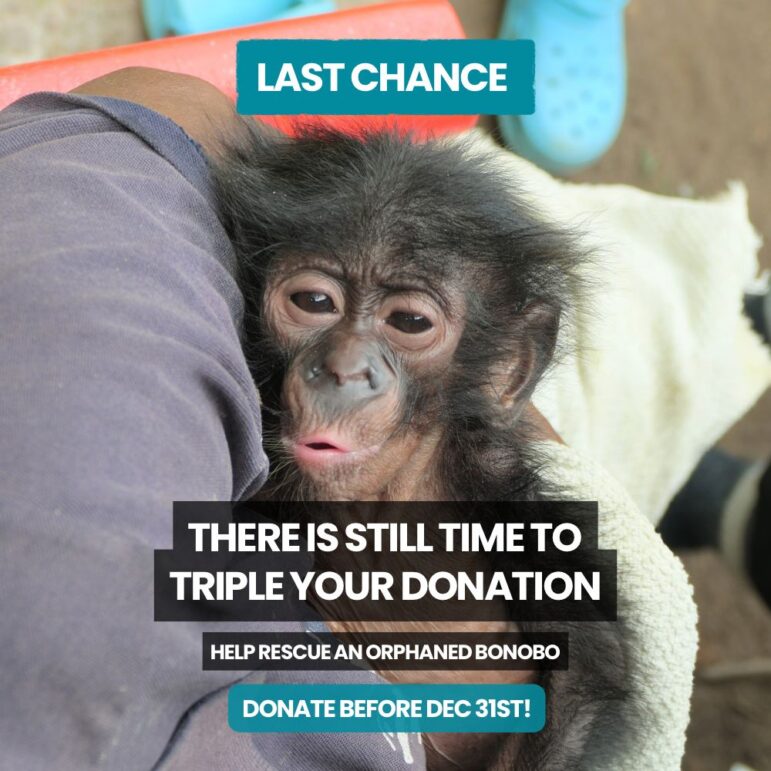
If you saw headlines about recent research on aggression in male bonobos, you might be wondering if bonobos’ storied reputation as the peaceful ape is fiction.
This New York Times headline was typical: “No ‘Hippie Ape’: Bonobos Are Often Aggressive, Study Finds”
The Smithsonian wrote: “In a new study published Friday in the journal Current Biology, scientists found that male bonobos are actually much more aggressive than assumed —even more so than the notoriously violent chimpanzees.”
Woah, more aggressive than “violent chimpanzees?” Not so fast!
Aggression – Male Bonobos vs Male Chimps

To understand the study, we must go beyond eye-catching, over-simplified headlines. The new findings add important details to the picture of bonobo behavior, no question. However, we contend that “hippie ape” still makes sense when comparing bonobos and chimpanzees.
Here’s why.
- “Free love” is a hippie mantra that bonobos embody completely. They have consensual, recreational sex with partners of any gender. There is no sexual violence among bonobos.
- Previous studies have shown the crucial role of female bonobos, who form coalitions to inhibit male aggression. Bonobos’ matriarchal society and female power structure are the reason male aggression doesn’t turn fatal. This study didn’t examine the role of females, so it’s only a partial picture.
- The intensity of aggression was lower among bonobo males – an important detail. While researchers found that male bonobos pushed, chased, and bit other males more often than chimps, that’s a far cry from murder, rape, and infanticide, which are often seen among chimpanzees. As the Harvard Gazette, put it, “… when chimps are aggressive, they’re aggressive to a more lethal degree. But bonobos, one could say, engage in more frequent but less intense squabbling.”
The Origin of ‘Hippie Ape’
“Hippie ape” was coined by the late Frans de Waal, primatologist and ethologist . He found bonobos fascinating and was keen to focus more attention on this understudied and little-known ape. He used engaging, descriptive language to talk about them.


Hippies are known for their “make love, not war” motto and credo of nonviolence. So, de Waal wasn’t stretching too far when he chose this nickname for the ape that uses sexual contact to resolve tension, shares its food, is led by female coalitions, and has never been known to kill fellow bonobos.
“Hippie ape” has strayed from its roots, though, like the phrase “survival of the fittest.” “Fitness” refers to an organism’s or species’ ability to reproduce and successfully pass on its genes to a new generation. As the phrase became popularized, “fitness” became equated with individual power or physical strength and associated with tough, alpha males and the idea of reproductive fitness got lost. Similarly, some now think “hippie ape” means bonobos don’t have an aggressive bone in their bodies. But de Waal wasn’t suggesting that bonobos never fight. Their “peacefulness” has always been in relation to chimps, their closest cousins – and ours.
The Matriarchal Bonobos
The study, “Differences in expression of male aggression between wild bonobos and chimpanzees,” measured aggression among male bonobos and chimps. It didn’t try to explain the role of females in
conflicts between males. Maud Mouginot, lead author, said she wanted to uncover whether aggression could explain why some male bonobos have more mating success than others.
She found more aggressive males did better with the ladies, just like chimps. Is aggression the reason for their success? It’s strongly suggested but the answer isn’t clear yet. Even so, her team’s findings may call into question the theory that male bonobos have evolved to be less aggressive because female bonobos prefer easygoing guys.


Each study builds on what came before to create a body of knowledge. For bonobos, this body of knowledge is patchy. They live only in remote, swampy forests in DR Congo, in a habitat and country where it’s challenging to conduct scientific research. There’s a need for much more. We look forward to future studies of bonobo society’s singular matriarchal structure, and how their female coalitions function to prevent murder and sexual violence–two things that horribly afflict humankind.
The new research shows just how much there is to learn about bonobos, which may give us insight into our own potential to create less violent, more harmonious societies.
But won’t discover it unless we prevent the extinction of our closest genetic relative – the unique and fascinating bonobo.



